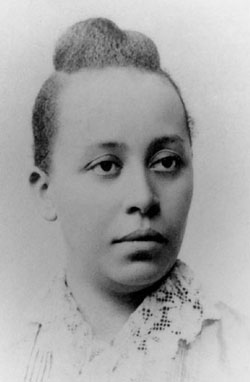Hazel I Jackson , a native of South Carolina, earned a bachelor’s degree in secondary English education from South Carolina State College and a master’s of education degree from Temple University. She did post-graduate work at Delaware University. Prior to moving to Lancaster in 1952, she taught four years in the public schools of South Carolina.
In 1961, Lancaster Sertoma Club began a mission to help African-Americans who had been deprived of job opportunities to get into their qualified fields. Every time she applied for a teaching postiion, she had to supply a picture along with the application, so school boards knew she was African-American. She was rejected 12 times–“not because of her credentials.” But, she didn’t let that stop her. It just inspired her to work harder to get a foot in the door as a subsitute teacher. Eventually, she was hired as an English teacher for seventh and eighth grade classes, at the former Hand Junior High School. She was the first African-American woman teacher in Lancaster.
She continued teaching in city schools until 1970, when she was chosen as the first African-American faculty member, an assistant professor of English and African-American literature at the former Millersville State Teachers College. 
In 1980, she was instrumental in renaming Higbee Elementary as Martin Luther King Jr. Elementary. She aslo chaired the M.L. King scholarship fund. And, along with Professor Bruce Kellner, initiated courses in African-American literature and instituted a Black Expressions program at Millersville, in which African-American students could perform in music, literature, drama, poetry and art.
Mrs. Jackson’s own artistic side showed through as she turned herself into a playwright and director. She wrote the play “From Trial to Triumph,” based on the life of Richard Allen, founder of the African Methodist Episcopal Church. The play was performed not only locally at Bethel AME Church, but also for the Harrisburg district and in the Philadelphia area. She helped with the script for Bethel’s Underground Railroad program. She also wrote “Profiles of Courage,” a play depicting the lives of famous African-American men and women, and “King of Kings,” a religious drama.
When she retired from Millersville University in 1994, she was honored with a $10,000 scholarship named the Hazel I. Jackson Scholarship Fund, the first scholarship the university has given in the name of an African-American. Mrs Jackson currently resides in Lancaster County, and serves as a Steward at Bethel AME Church of Churchtowne, Lancaster PA.











 Episcopal bishop Benjamin Tucker Tanner and Sarah Elizabeth Miller in Pittsburgh, Pennsylvania in 1864. Her brother, Henry Ossawa Tanner, became a noted artist. Shortly after Halle was born the Tanners moved to Philadelphia where the children were educated.
Episcopal bishop Benjamin Tucker Tanner and Sarah Elizabeth Miller in Pittsburgh, Pennsylvania in 1864. Her brother, Henry Ossawa Tanner, became a noted artist. Shortly after Halle was born the Tanners moved to Philadelphia where the children were educated.